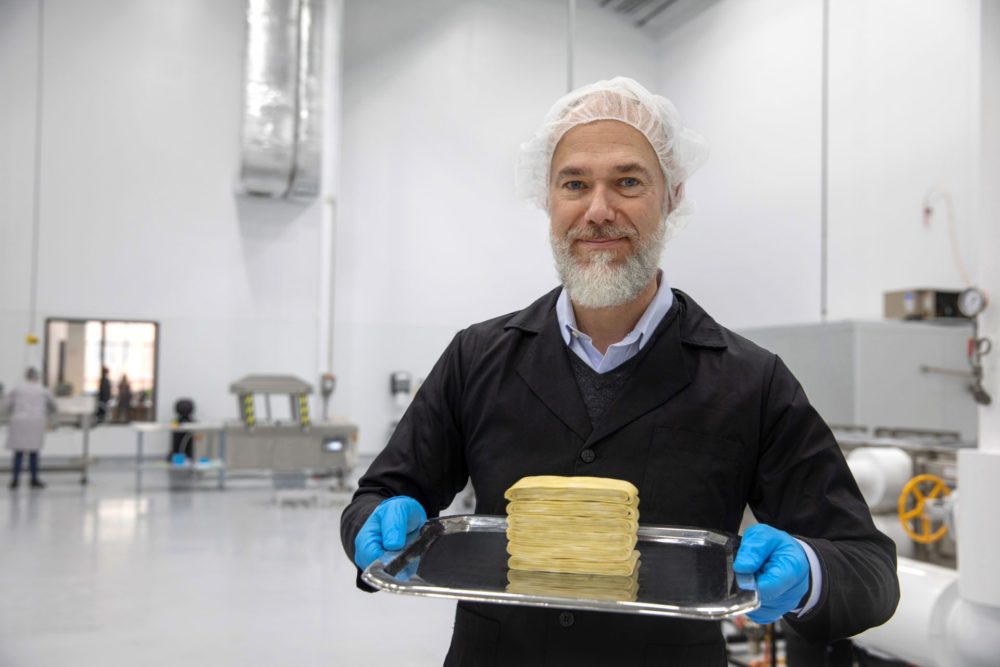Nature’s Fynd has secured $45 million in venture debt funding from Oxford Finance and Trinity Capital. The financing is intended to help the startup accelerate its go-to-market strategy and introduce more products, including meat and dairy substitutes.
“It’s a smart way for us to increase our cash position without diluting ourselves anymore,” Nature’s Fynd CEO Thomas Jonas told AFN. “We are getting really close to commercialization, we’re setting up the technology, and we want to make sure we are smart about our financial strategy.”
The Chicago-based startup — formerly known as Sustainable Bioproducts — is known in agrifoodtech circles for its discovery of a microbe in the geothermal springs of the US’s Yellowstone National Park that can support protein production.
It describes Fy, its flagship product made by fermenting the microbe, as a “nutritional fungi protein” that uses a fraction of the resources required to support traditional agriculture.
Spun out of a NASA-supported research effort into organisms that thrive in extreme conditions, Nature’s Fynd maintains an R&D center in Montana close to the source of its core microbe, Fusarium str. Yellowstonensis. Fy contains all nine essential amino acids, as well as dietary fiber, calcium, and vitamins.
This latest financing follows an $80 million Series B round in March 2020. The startup boasts some big-name investors like Breakthrough Energy Ventures, the $1 billion fund backed by moguls Bill Gates, Jeff Bezos, Richard Branson, Michael Bloomberg, and John Doerr; and Generation Investment Management, the $25 billion multi-stage investment firm started by environmental activist and former US vice president Al Gore. ADM Ventures, Danone Manifesto Ventures, and 1955 Capital are also backers.
Despite these prominent backers and the substantial funding they’ve provided, Nature’s Fynd hasn’t been immune from the economic challenges brought on by Covid-19.
“We closed the Series B the very same day that the financial market tanked,” Jonas said, though he added that the startup has been in “stealth mode” since then, reducing the potential impact of the pandemic on its business.
“[Our prospective customers] were really focusing on just doing the basics for the first three to five months of the pandemic and have been playing catch up ever since. There has been some delay in the decision-making process.”
While it has faced a slowdown in sales and marketing groundwork as well as some construction-related delays, Nature’s Fynd is still on track to meet its commercialization timeline goals, according to Jonas. It has increased its payroll to 100 employees in recent months and has been able to continue scaling up its technology, he said.
Prepping for commercialization
Among those new hires, Nature’s Fynd has added a number of food industry power players to its roster. Baljit Singh Ghotra has joined from ADM to become senior vice president of food innovation; Emilie Runac takes up the post of director of manufacturing after 16 years at Baby Bel; and former KIND Snacks and Danone exec Pat Dalugdug is the startup’s new director of sales.
Tom Frey also joins the startup as director of project engineering after a 16-year stint at Cargill, where he served as an engineering manager. With a background in implementing fermentation technologies, Frey will work on scaling products for commercial launch, which the company is targeting for 2021.
“We will be launching as a B2C and we want to make sure that we have all the funding that we need to launch and sell the brand, promote it on the shelf, and really be able to support ourselves as retailers as we go commercial in 2021,” Jonas said.
Why did global food giant ADM invest in volcanic microbes? Find out here
Covid-19 has had a somewhat positive impact on alternative proteins like Fy as people become more conscious about their health and more thoughtful about where their food products come from, he continued.
However, with a slew of alt-protein products hitting the market, Nature’s Fynd may have to work harder to explain the different proposition of Fy compared to the myriad competing formulations based on soy, yellow pea, and other plant protein sources.
“We describe it as a fungi that we discovered in Yellowstone, in a volcanic spring, that’s a great source of protein [and] can be made into a variety of products. A few months after Covid-19 hit, we saw a jump in interest,” Jonas said.
“There are some questions around the level of processing required when you make plant-based protein. [It is] not necessarily the most energy-efficient or cleanest process – you’re removing a lot of the good stuff just by making the protein isolate. Fy is fundamentally a whole-food product of nature that we harvest.”





